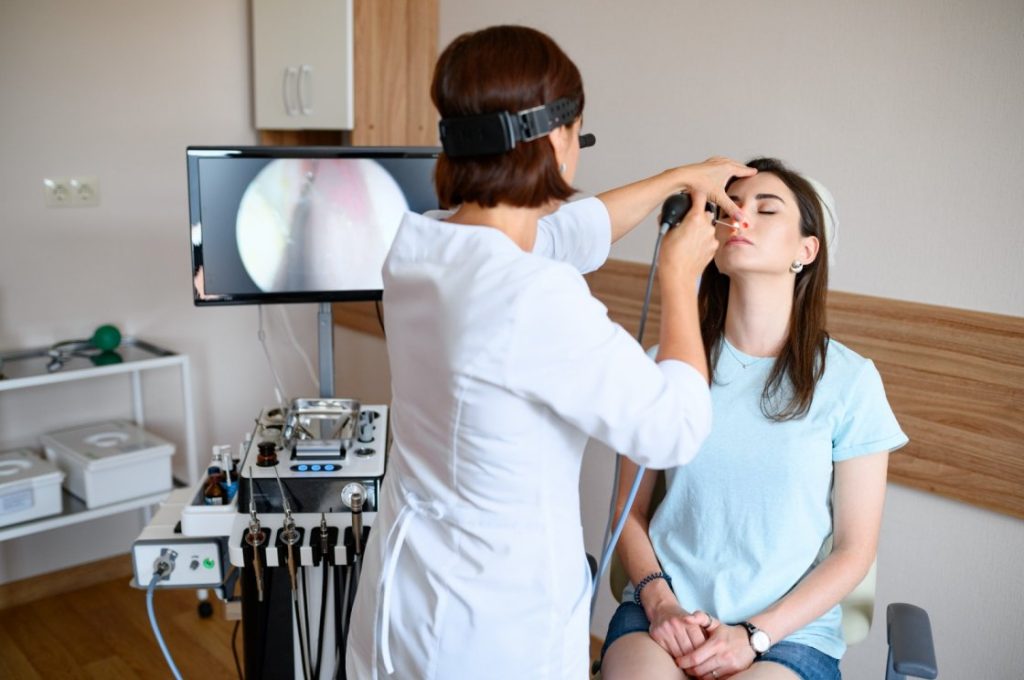Acute sinusitis is most commonly due to viruses and is usually self-limiting. Approximately 90% of patients with colds have an element of viral sinusitis. Those with atopy or a genetic tendency to develop allergic diseases, commonly get sinusitis, which allergens, irritants, viruses, fungi and bacteria can trigger. This inflammation can make breathing difficult through your nose and lead to facial pain, congestion and other symptoms.
What Causes Sinusitis?
Sinusitis occurs when the tissues lining the sinuses become inflamed or swollen, leading to symptoms such as nasal congestion, facial pain or pressure, headaches and a feeling of fullness in the ears. Several factors can lead to the development of sinusitis. The most common include:
- Viral Infections: Most cases of sinusitis start with a cold or virus. These infections are the main triggers of sinus inflammation.
- Bacterial Infections: In some cases, bacteria can cause sinusitis, especially when a virus lasts longer than about ten days.
- Fungal Infections: These are less common and usually affect people with weakened immune systems.
- Allergies: Allergic reactions to things like pollen and pets can also lead to sinusitis. They cause inflammation that blocks the sinuses.
- Nasal Polyps: These tissue growths can block the nasal passages or sinuses.
- Deviated Septum: A crooked septum—the wall between the nostrils—can restrict or block sinus passages.
- Other Medical Conditions: Conditions that affect the immune system, like HIV or cystic fibrosis can increase sinus infection risks.
Common Symptoms of Sinusitis
Sinusitis, whether acute or chronic, often presents with a variety of symptoms that can significantly impact a person’s quality of life. Recognising these symptoms is essential for timely diagnosis and treatment. Here are some common symptoms of sinusitis:
- Stuffy or runny nose
- Facial pain or pressure
- Mucus drainage in the throat (postnasal drip)
- Nasal congestion
- Cough or congestion
- Fever
- Fatigue
- Bad breath
How Sinusitis is Diagnosed?
Doctors diagnose sinusitis based on symptoms and a physical examination. They might look inside your nose for signs of inflammation and tap over a sinus area to find infection. Sometimes, imaging tests such as X-rays or CT scans are necessary, especially for chronic sinusitis.
Treatment Options for Sinusitis
Treatment for sinusitis depends on the underlying cause, severity of symptoms and whether the condition is acute or chronic. Here are some common treatment options for Sinusitis have been listed below:
- Nasal Decongestants: Over-the-counter nasal decongestant sprays or drops can help reduce nasal congestion by shrinking swollen nasal tissues. However, these should not be used for more than a few days as prolonged use can lead to rebound congestion, where the symptoms worsen once the medication is stopped.
- Saline Nasal Irrigation: Saline nasal irrigation involves rinsing the nasal passages with a saline solution to flush out mucus and irritants. This can help relieve congestion, reduce inflammation and promote sinus drainage. Neti pots, squeeze bottles or nasal irrigation kits can be used for this purpose.
- Nasal Corticosteroids: Nasal corticosteroid sprays are commonly prescribed to reduce inflammation in the nasal passages and sinuses. These medications help alleviate symptoms such as nasal congestion, facial pain and postnasal drip. They are often used as a first-line treatment for both acute and chronic sinusitis.
- Pain Relievers: Over-the-counter pain relievers such as acetaminophen (Tylenol) or ibuprofen (Advil, Motrin) can help alleviate sinus pain, headaches and fever associated with sinusitis. However, aspirin should be avoided in children and teenagers due to the risk of Reye’s syndrome.
- Antibiotics: Antibiotics may be prescribed for bacterial sinusitis, particularly if symptoms are severe or do not improve within a few days. Commonly used antibiotics for sinusitis include amoxicillin, amoxicillin-clavulanate (Augmentin) and trimethoprim-sulfamethoxazole (Bactrim). It’s essential to complete the full course of antibiotics as prescribed by our pharmacists, even if symptoms improve before the medication is finished.
- Allergy Medications: If allergies are contributing to sinusitis symptoms, antihistamines or allergy medications may be recommended to reduce inflammation and alleviate allergy-related symptoms. These medications may include oral antihistamines, nasal antihistamine sprays or allergy shots (immunotherapy) for long-term management.
- Intranasal Corticosteroid Sprays: For individuals with chronic sinusitis or nasal polyps, intranasal corticosteroid sprays may be prescribed to reduce inflammation and shrink nasal polyps. These medications are often used in combination with other treatments to improve symptom control and prevent recurrence.
- Surgery: In cases of severe or recurrent sinusitis that does not respond to conservative treatments, surgery may be necessary. Functional endoscopic sinus surgery (FESS) is a minimally invasive procedure performed to remove blockages in the sinuses, improve drainage and restore normal sinus function. Surgical intervention may also be required to address structural abnormalities such as a deviated septum or nasal polyps.
- Home Remedies: In addition to medical treatments, several home remedies may help alleviate symptoms of sinusitis. These include staying hydrated, using humidifiers to moisten the air, applying warm compresses to the face, practising steam inhalation and avoiding known triggers such as allergens and irritants.
Book Your Sinusitis Consultation at Touchwood Pharmacy Today!
Sinusitis can be uncomfortable and persistent, significantly affecting your daily life. Understanding the causes and exploring effective treatments can help you manage this condition effectively. Whether through simple home remedies, medications or more direct medical procedures, there are several ways to relieve the symptoms and improve your quality of life.
Get immediate relief from sinus infections with Pharmacy First at Touchwood Pharmacy. Our qualified pharmacists are ready to provide you with expert advice and effective treatment options tailored to your needs. Don’t let sinusitis slow you down. Book an appointment with us today and breathe easier knowing help is just around the corner.


























